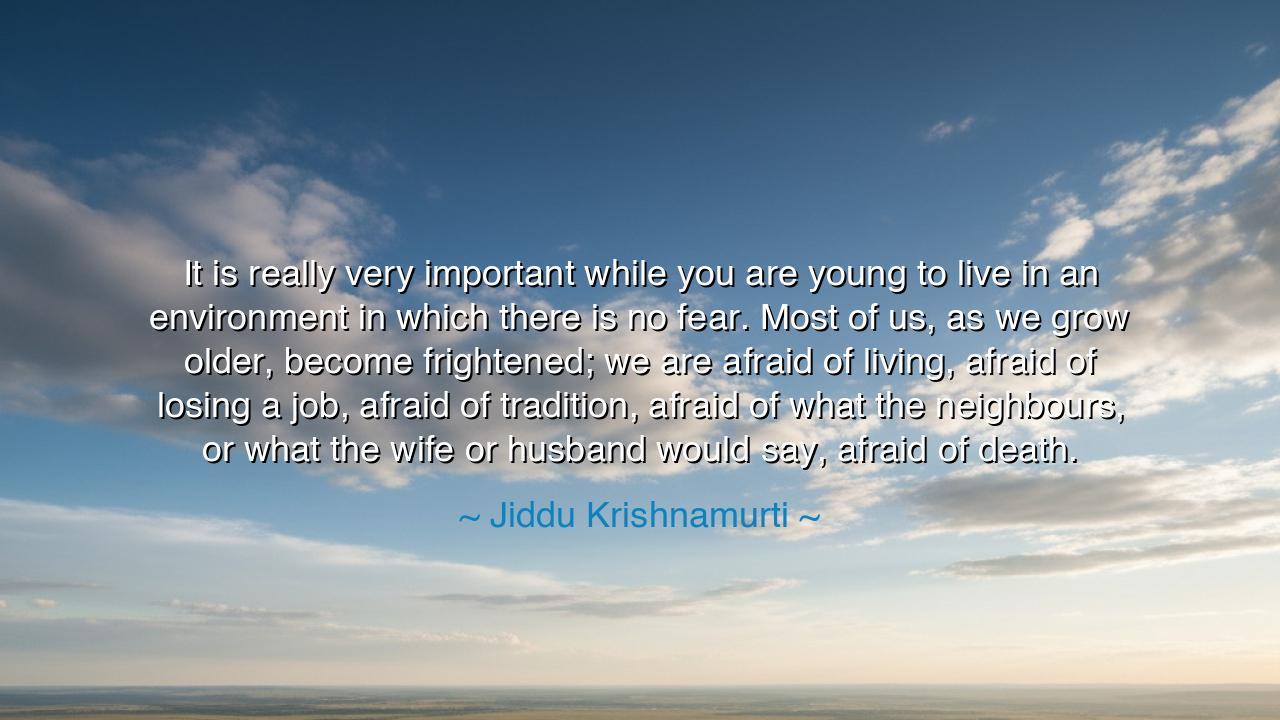
It is really very important while you are young to live in an
It is really very important while you are young to live in an environment in which there is no fear. Most of us, as we grow older, become frightened; we are afraid of living, afraid of losing a job, afraid of tradition, afraid of what the neighbours, or what the wife or husband would say, afraid of death.






The philosopher Jiddu Krishnamurti, whose words have illuminated the inner paths of many seekers, once said: “It is really very important while you are young to live in an environment in which there is no fear. Most of us, as we grow older, become frightened; we are afraid of living, afraid of losing a job, afraid of tradition, afraid of what the neighbours, or what the wife or husband would say, afraid of death.” In these words, we hear the deep lament of a man who had looked into the hearts of humanity and seen that fear, more than any other force, rules our lives. His message is not merely a reflection—it is a call to liberation. For Krishnamurti understood that fear is the unseen chain that binds the soul and prevents it from knowing freedom, love, and truth.
To understand this quote, we must first understand Krishnamurti himself. Born in 1895 in colonial India, he was once hailed as a “World Teacher” by the Theosophical Society, destined—so they claimed—to bring spiritual enlightenment to humankind. Yet Krishnamurti rejected all such titles, renouncing authority and dogma alike. He devoted his life instead to teaching that truth cannot be found through obedience, but through awareness. His philosophy was one of radical freedom—freedom from the patterns of thought, belief, and fear that condition the mind. It was from this deep well of insight that he spoke of the importance of living, especially in youth, in an atmosphere free from fear. For only in such an environment can the mind grow without distortion and the heart learn to love without anxiety.
Krishnamurti’s words are an observation of life’s tragedy. He saw that as children, we begin with wonder, curiosity, and courage—the soul’s natural state. But as we grow, society molds us through reward and punishment, approval and shame. Fear becomes our companion: the fear of failure, the fear of rejection, the fear of death. We learn to seek safety in conformity, and in doing so, we forget how to live. The world, which once seemed vast and beautiful, becomes a cage built by our own thoughts. This is what he means when he says that most people are “afraid of living.” They are not truly alive—they merely exist, governed by the opinions and expectations of others.
Consider the life of Galileo Galilei, the great astronomer who faced the wrath of the Church for declaring that the Earth moved around the sun. He stood alone against tradition, risking exile, imprisonment, and even death for the sake of truth. Most of his contemporaries, bound by fear, chose silence. Yet Galileo, though frightened, refused to bow before ignorance. His courage to see and speak what others would not is the very freedom Krishnamurti speaks of—the freedom born not from the absence of danger, but from the absence of fear’s domination. Galileo’s mind was unconditioned, his spirit untouched by the terror that enslaved others. And though his body suffered, his vision lit the path for all who came after.
Krishnamurti’s insight also reaches into the intimate corners of human life. He names the fears that haunt ordinary people—the fear of losing one’s job, the fear of what others think, the fear of not belonging, the fear of dying. These are not grand terrors of the battlefield, but quiet poisons that corrode the heart day by day. A man may walk through life outwardly successful, yet inwardly caged, afraid to be himself, afraid to love freely, afraid to question the rules that keep him small. Such a man is not alive in the true sense; he is a ghost moving through habit. Krishnamurti’s call is to awaken—to see fear for what it is: a construct of thought, a shadow that dissolves when faced with light.
The philosopher teaches that freedom from fear begins not through resistance, but through understanding. One must watch fear as one would watch a cloud passing through the sky—without judgment, without suppression, without escape. When you observe fear without trying to run from it, you see that it is merely thought imagining loss or pain. And in that moment of awareness, fear begins to lose its power. This is why Krishnamurti insists that young people must grow in an environment free of fear—because a fearful mind cannot discover truth. It will always seek authority, always cling to comfort, always obey rather than question. But the fearless mind—alive, open, curious—can see life as it is, and in that seeing lies wisdom.
Lesson and Practice:
Do not let fear shape the architecture of your life. When you feel its whisper—fear of failure, fear of judgment, fear of loss—pause and look directly at it. Ask whether the danger is real or imagined. Speak truth even when your voice trembles, act with kindness even when misunderstood, and live with courage even when uncertain. Create within yourself the environment Krishnamurti spoke of—an inner space without fear, where love and curiosity can grow freely. For as long as you are afraid, you are not free. But when fear falls away, even for a moment, you discover what it means to live fully—and that, as Krishnamurti taught, is the beginning of true wisdom and peace.






AAdministratorAdministrator
Welcome, honored guests. Please leave a comment, we will respond soon